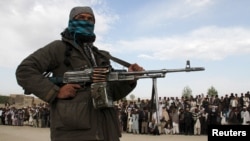Afghanistan’s fundamentalist Taliban authorities publicly executed two men Thursday who had been convicted of murder in separate incidents.
The Taliban’s Supreme Court said the executions, by gunshot, were carried out in a football stadium in the southeastern city of Ghazni.
A large number of justice and government officials, as well as residents, witnessed the event, but no one was allowed to bring cellular phones or cameras to the stadium.
The court statement said the two put to death were tried and found guilty of fatally stabbing two people. It added that the judicial order was enforced after the Taliban supreme leader, Hibatullah Akhundzada, approved it.
The Taliban have executed four people and flogged around 350 others, including women, in front of hundreds of onlookers since reclaiming power in August 2021 and imposing their harsh interpretation of Islamic law. Female victims were mostly accused of crimes such as adultery and running away from homes.
Taliban government spokesman Zabihullah Mujahid defended Thursday’s executions. “The court order took all the Sharia standards into consideration,” he said on X, formerly known as Twitter.
The United Nations has criticized the punishments as violations of human rights, saying they run counter to international law and must stop.
The U.N. Assistance Mission in Afghanistan, or UNAMA, renewed the criticism while commenting on Thursday’s killings, calling them inconsistent with the fundamental right to life.
“UNAMA urges the de facto authorities to establish an immediate moratorium on the use of the death penalty as a step towards its abolition,” the mission wrote on X.
The Taliban have rejected the criticism, saying their criminal justice system and governance at large are based on Islamic rules and guidelines.
Public floggings and executions were routine under the previous Taliban government in Afghanistan from 1996 to 2001.
Afghan authorities have imposed sweeping restrictions on women’s rights to education and public life. They have barred female visitors from parks and gyms and forbidden girls from attending schools beyond the sixth grade.
The Taliban have ignored international outcry and calls for removing curbs on women. The treatment of women has mainly deterred foreign governments from recognizing the Taliban administration in Kabul.
A U.N. expert panel this week called for other countries to officially recognize "gender apartheid" as a crime against humanity, highlighting the oppression of women and girls under regimes like the Taliban in Afghanistan.




